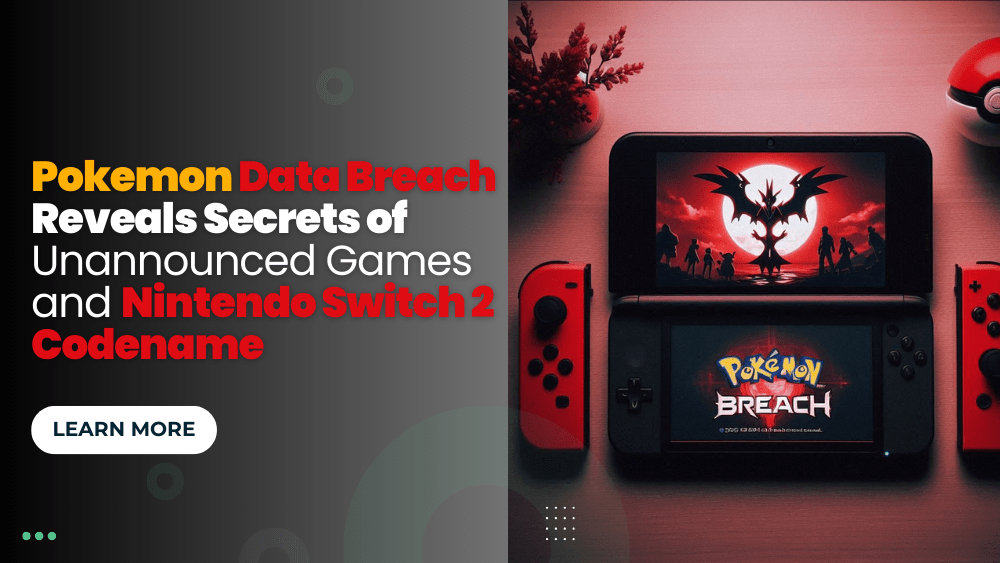A significant data breach at Game Freak, the developer behind the wildly popular Pokémon franchise, has sent shockwaves through the gaming community.
The Pokemon Data Breach incident, confirmed by Game Freak in a statement released on October 10th, 2024, involved unauthorized access to their server resulting in the exposure of sensitive information, including details on unreleased Pokémon games and even the codename for the upcoming Nintendo Switch 2.
The Pokemon data leak is a major blow to the company and raises serious concerns about data security within the gaming industry.
The Extent of the Pokemon Data Leak: Codenames and More
The initial report, published by Nintendo Life, detailed the extent of the Pokemon data leak. Leaked information includes codenames for several projects: “Gaia,” the codename for the unannounced 10th generation Pokémon game; “Ounce,” the codename for the Nintendo Switch 2; and “Ikkaku,” the codename for the already-announced Pokémon Legends: Z-A.
Further fueling speculation, codenames “K” and “N” surfaced, suggesting two versions of the 10th generation game, potentially indicating a cross-gen release across both the current Switch and its successor. The “Ounce” codename’s association with the 10th generation games hints at a potential launch on the new console.
Adding to the severity of the Pokemon data breach, the leak also revealed the existence of a project codenamed “Synapse,” an unannounced Pokémon game reportedly co-developed with another studio. Speculation points towards this being a Pokémon MMO, a highly anticipated genre entry for the franchise. The leak extends beyond new titles; source code for older DS titles, Pokémon HeartGold, SoulSilver, Black 2, and White 2, was also compromised, resulting in the online release of unused assets, including Pokémon sprites and music.
Beyond Game Assets: Pokemon Data Breach Leaked Internal Documents and Unannounced Projects
The breadth of the Pokemon data leak is staggering. Beyond game assets, the stolen data includes internal documents such as emailed meeting summaries and detailed Pokémon lore information. Perhaps most surprisingly, the leak also revealed the existence of a previously unannounced live-action Pokémon show in development with Netflix. Furthermore, plot details for an unreleased sequel to the 2019 Detective Pikachu movie, tentatively titled The Great Detective Pikachu, were also compromised. This sequel, planned for a 2024 release, appears to have been canceled, adding another layer of intrigue to the leak.
The Pokemon Data Breach incident echoes the infamous Nintendo “gigaleak” of 2020, a massive data breach that revealed canceled games, prototypes, source code, and internal communications. The current Pokemon data breach, however, focuses specifically on Game Freak and its projects, offering a unique insight into the company’s development processes and future plans.
Game Freak’s Response and Industry Implications
Game Freak’s official statement acknowledges the August 2024 data breach, confirming the unauthorized access and the compromise of 2,606 current, former, and contract employee names and email addresses. While the statement apologizes for the incident and assures the vulnerability has been addressed, it notably omits mention of the broader Pokémon data leak, focusing solely on employee information. Neither Nintendo nor The Pokémon Company initially commented on the leaks, though The Pokémon Company has since issued a statement acknowledging the breach.
The Pokemon data leak underscores the vulnerability of even the largest gaming companies to cyberattacks. The release of this sensitive information not only jeopardizes the secrecy surrounding upcoming titles but also raises concerns about the potential misuse of employee data. The impact of this breach on the future of the Pokémon franchise and the Nintendo Switch 2 remains to be seen, but its significance is undeniable. The Pokemon data breach serves as a stark reminder of the importance of robust cybersecurity measures within the gaming industry.









